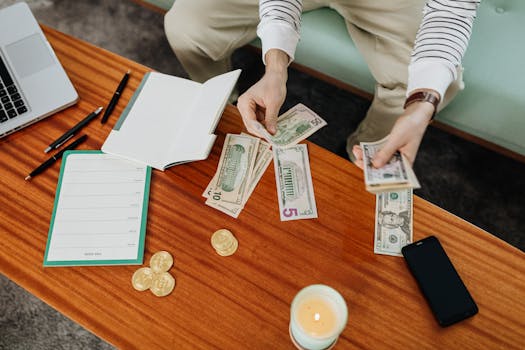The Importance of Emergency Funds in Financial Planning
As an Amazon Services LLC Associates Program participant, we earn advertising fees by linking to Amazon, at no extra cost to you.
New Perspectives on Emergency Fund Goals
Most people think an emergency fund is just about covering basic living expenses. I believe it should also reflect your lifestyle. Imagine having enough savings to maintain your routine during tough times.
Many experts recommend saving three to six months’ worth of expenses. But why stop there? Consider what it takes to keep your life comfortable. This can ease stress and support mental health.
According to Starr Tarver from MAU, “Establishing an emergency fund can break the cycle of debt.” This isn’t just about money; it’s about peace of mind.
People often underestimate the psychological benefits of a solid emergency fund. It’s not just a safety net; it’s a foundation for making confident financial choices. Knowing you can handle unexpected costs without debt is liberating.
Now, let’s talk about alternative approaches. Some say you need a big chunk saved first. I disagree. Start small! Even a few dollars can build momentum. Use apps that round up purchases and save the difference. It’s that simple!
Another idea? Set specific goals for your fund. Think about what you want to cover. Is it just essentials, or do you want a cushion for luxuries? This clarity can motivate you to save more.
In conclusion, rethink your emergency fund goals. It’s not just about surviving; it’s about thriving. Build a fund that reflects your life and gives you the freedom to live it fully.
The Importance of Emergency Funds in Financial Planning
Emergency funds are more than just savings; they are a cornerstone of financial stability and peace of mind. Here’s why they matter:
- Emergency funds prevent debt. They act as a financial cushion during unexpected events.
- They provide peace of mind. Knowing you have savings reduces stress during tough times.
- Emergency funds promote better financial decisions. With a safety net, you’re less likely to make impulsive choices.
- They allow for lifestyle continuity. A robust fund keeps your quality of life intact during financial hardships.
- You’re empowered to handle emergencies. With savings, you can tackle issues without panic or borrowing.
- Emergency funds support mental health. Financial security leads to reduced anxiety and a healthier mindset.
Top Strategies for Emergency Fund Savings
Here are some impactful strategies to build your emergency fund effectively. These tips can help you save efficiently and gain financial confidence.
- Treat your emergency fund like a bill. Automate transfers to a high-yield savings account every month.
- Save windfalls directly. Tax refunds or bonuses? Dump them straight into your emergency fund.
- Cut back on non-essentials. Reduce dining out or subscription services to free up cash for savings.
- Set a no-spend challenge. For a month, avoid all non-essential purchases. Save the difference!
- Use apps to save effortlessly. Round up purchases and save the spare change automatically.
- Start small and build. Even $10 a week adds up. Consistency is key!
- Review and adjust your budget. Regularly check your spending. Adjust to boost your savings.
- Consider a side gig. Extra income can accelerate your savings. Explore freelance or part-time work.
- Use financial apps. Track your progress and keep your goals visible. Motivation matters.
- Educate yourself. Understanding finance boosts confidence. Knowledge equals power!
including available types of disaster financial assistance and the role of presidential disaster declarations in the process. Types of Disaster Financial …
It takes discipline and planning to save. Saving means putting off using money today so you have money for future needs. An emergency fund is very useful in …
Start an emergency fund before disaster strikes | UMN Extension
The University of Minnesota has created emergency funds to assist and support University of Minnesota students who encounter an unforeseen financial emergency.
Student emergency funds | Twin Cities One Stop Student Services
Identifying Unexpected Expenses
Understanding unexpected expenses is key to financial planning. Here’s what you need to know:
- Emergency funds cover medical bills and car repairs. These costs can hit hard and fast, leaving you scrambling.
- Job loss can lead to sudden financial strain. An emergency fund helps bridge the gap until you find new employment.
- Home repairs can be unexpected. Issues like a broken furnace or leaky roof need immediate attention and funds.
- Unforeseen travel expenses can arise. Whether it’s a family emergency or a last-minute trip, having funds ready is crucial.
- Unexpected bills can disrupt your budget. From medical emergencies to urgent home repairs, they can throw you off course.
How to Approach Emergency Fund Savings
Here’s how I think you should tackle building your emergency fund. These points will help you understand its importance in financial planning.
- Emergency funds are your financial safety net. They protect you from unexpected expenses like medical bills or car repairs.
- Think of your emergency fund as a non-negotiable expense. Treat it like rent; it’s essential for financial security.
- Set up automatic transfers to your savings. This makes saving effortless and consistent.
- Use windfalls wisely. Tax refunds or bonuses? Direct them to your emergency fund instead of splurging.
- Consider a no-spend challenge. This can boost your savings significantly by cutting out non-essential purchases.
- Establish clear savings goals. Knowing how much to save and when creates a roadmap for success.
- Don’t let myths hold you back. You don’t need a huge amount to start; even small amounts add up.
- Track your spending triggers. Understanding your emotional spending can help you save more effectively.
Mar 31, 2020 … The coronavirus pandemic has driven home the importance of financial management and emergency savings accounts … Search this site. Search.
We've all experienced unexpected financial emergencies—a fender bender, an unexpected medical bill, a broken appliance, a loss of income, or even a damaged …
An essential guide to building an emergency fund | Consumer …
Fire Incidents for states and counties. See the incidents. Disasters & Assistance · Grants · Floods & Maps · Emergency Management …
Oct 5, 2023 … An emergency fund (aka a rainy day fund) is cash that's set aside to cover the cost of unexpected, and often expensive, events. These savings …
What is an emergency fund, and why is it important? | Discover
Understanding the Role of Emergency Funds in Financial Stability
Emergency funds are more than just a savings account. They are your safety net against life’s curveballs. Having one can prevent you from spiraling into debt.
Many believe that saving for emergencies is optional. I think it’s a must because unexpected expenses can pop up at any time. This fund allows you to tackle surprises without financial panic.
Think about it. Medical bills, car repairs, or job loss can hit hard. With an emergency fund, you can face these challenges head-on. According to Starr Tarver from MAU, “Establishing an emergency fund can break the cycle of debt by providing a source of funds without resorting to high-interest loans or credit.” That’s powerful!
Some might say that a small fund isn’t worth the effort. But I disagree. Even a few hundred dollars can provide a cushion. It’s about peace of mind. You can make decisions without the stress of financial insecurity.
Many financial experts recommend saving three to six months’ worth of living expenses. But what if you can’t reach that goal right away? Start small! Gradually build your fund over time. Every little bit adds up.
Some people think they need to have a significant amount saved before they start. I believe that’s a myth. You can begin with whatever you can afford. The key is to start saving now. Don’t wait for the perfect moment.
For those looking for alternative methods, consider the ‘no spend challenge.’ This technique encourages you to avoid non-essential purchases for a month. The money saved can boost your emergency fund significantly. It’s a fun way to save!
Another perspective to consider is the idea of a comfortable emergency fund. It’s not just about covering basic expenses. It’s about maintaining your lifestyle during tough times. This added security can greatly reduce anxiety about finances.
In the end, having an emergency fund is about empowerment. You’re not just saving money; you’re investing in your peace of mind. So, take control of your financial future—start your emergency fund today!
Common Myths About Emergency Funds
Many people think you need a huge amount saved before starting an emergency fund. I believe that even a small amount can make a big difference. Starting small can lead to greater savings over time.
Another common myth is that an emergency fund is only for job loss. Unexpected medical bills or car repairs can happen to anyone. Having funds set aside for these situations is just as important.
Some say you should only use your emergency fund for true emergencies. I think it’s okay to use it for any unexpected expense that disrupts your financial stability. It’s about securing your peace of mind.
People often believe they can rely on credit cards instead of having an emergency fund. This mindset can lead to debt and anxiety. An emergency fund offers a safer, stress-free option.
Many assume that once an emergency fund is established, it doesn’t need to be revisited. I argue that it should be a dynamic part of your financial plan, adjusting as your life and expenses change.
Lastly, some believe that financial literacy is not essential for managing an emergency fund. According to Alan Greenspan, “Lack of financial literacy leads to stress and anxiety over financial matters, underscoring the importance of having a safety net” from Grand Canyon University.
Understanding these myths can empower you to take control of your finances. Don’t let misconceptions hold you back from building your financial security.
Key Strategies for Building Your Emergency Fund
Most people think saving for an emergency fund is a slow process. I believe it can be quick and efficient if you approach it creatively. For example, consider setting up automatic transfers to a high-yield savings account. Treat that transfer like a bill—non-negotiable and essential.
Many suggest saving windfalls like tax refunds directly into your emergency fund. This method can significantly boost your savings without altering your regular budget. No way! It’s that simple!
Another approach is to reduce discretionary spending. Cut back on dining out or entertainment, and funnel those savings into your fund. Every little bit counts. You might be surprised how quickly it adds up!
Some folks swear by the ‘no spend challenge.’ This means avoiding all non-essential purchases for a month. The money you save can go straight into your emergency fund. It’s a great way to build awareness about your spending habits.
As noted by Ann Gomez from Our Lady of the Lake University, “Creating a budget that accounts for an emergency fund is essential to ensure consistent contributions and financial stability.” This highlights how crucial it is to plan.
Consider your emotional triggers too. Some mental health professionals recommend tracking your spending against your feelings. Understanding why you spend can help you save more effectively.
And don’t forget the myths surrounding emergency funds. Many believe you need a large amount saved before starting. I think that’s misleading. Even a small fund can provide peace of mind and security.
Lastly, let’s talk about setting goals. Define how much you want to save and for what situations. Having clear goals can motivate you to stick with your plan.
The Importance of Emergency Funds in Financial Planning
Emergency funds are not just a safety net; they are a lifeline. Without one, financial stability can feel like walking a tightrope. Unexpected expenses can strike at any moment, and without savings, the fallout can be devastating.
Most people think having a small emergency fund is enough. I disagree. A robust emergency fund allows you to maintain your lifestyle even during financial setbacks. It’s not just about covering bills; it’s about peace of mind.
When I think about financial planning, I see emergency funds as a cornerstone. They prevent the need to rely on credit cards, which can spiral into debt. As Starr Tarver from MAU puts it, “Establishing an emergency fund can break the cycle of debt.”
But let’s talk about the psychological perks too. Knowing you have money set aside reduces anxiety. It’s like having a financial buffer that allows you to breathe easier during tough times.
Some people suggest that building an emergency fund takes too long. I believe in the ’60-day rule’—set aside what you might impulsively spend over the next two months. This way, you can bulk up your savings without sacrificing essentials.
Another myth? You need a massive fund to start. That’s simply not true. Starting small and gradually building can be just as effective. It’s all about the habit of saving.
According to Alan Greenspan, “Lack of financial literacy leads to stress and anxiety over financial matters.” Educating yourself about emergency funds can empower you to take control of your finances.
Ultimately, an emergency fund is not just a financial tool; it’s a pathway to financial freedom.
Alternative Approaches to Saving
Here are some innovative ways to build your emergency fund that challenge conventional methods.
- Most people think an emergency fund must start big. I believe starting small is better. It allows you to build momentum without feeling overwhelmed.
- Many suggest saving a percentage of your income. I think saving a fixed dollar amount each month is more manageable. It creates a routine without the pressure of fluctuating percentages.
- Some say to cut all discretionary spending. I suggest the ‘fun fund’ approach. Set aside a small amount for enjoyment while still saving for emergencies.
- Most financial experts recommend a high-yield savings account. I think exploring investment options could yield better returns. Just ensure you have a safety net for short-term needs.
- People often believe saving requires sacrifice. I think gamifying savings can make it fun. Use apps to track progress and reward yourself for milestones.
How much should I keep in my emergency fund?
Most people think you need a hefty sum saved up. But I believe even a small amount can make a big difference. The general advice is to aim for three to six months’ worth of living expenses.
However, I think you should tailor this to your situation. If you have a stable job, maybe three months is enough. But if your income is unpredictable, consider saving more.
Starr Tarver from MAU says, “Establishing an emergency fund can break the cycle of debt.” That’s why having any cushion is better than none.
Also, focus on building your fund gradually. Start small, and increase your contributions over time. This way, you won’t feel the pinch as much.
Some suggest using the ’60-day rule’ to boost your savings without cutting into essentials. Set aside what you plan to spend impulsively over the next two months into your fund instead.
Ultimately, it’s about peace of mind. Knowing you have a financial safety net can change how you approach your finances.
What unexpected expenses do emergency funds cover?
Emergency funds are your safety net for life’s surprises. Think medical bills, car repairs, or even sudden job loss. Without this cushion, you might rely on credit cards, which can spiral into debt.
Many believe that only major expenses qualify for an emergency fund. I disagree. Small, unexpected costs like home repairs or urgent travel can quickly add up. These are real emergencies too!
According to Starr Tarver from MAU, “Establishing an emergency fund can break the cycle of debt by providing a source of funds without resorting to high-interest loans or credit.” This highlights how crucial it is to be prepared.
Some experts suggest a more structured approach. Instead of waiting for emergencies, why not set aside a bit each month? This proactive mindset can really change how you handle financial stress.
Ultimately, your emergency fund should cover anything that disrupts your financial flow. Don’t underestimate the peace of mind it brings!
How can I set achievable savings goals?
Setting achievable savings goals for your emergency fund is a game changer. Most people think they need to save a large amount right away. I believe starting small is the way to go because it builds confidence and momentum.
Begin by determining your essential expenses. This gives you a clear target. For instance, if your monthly expenses are $2,000, aim for a minimum of $6,000 for three months. This is a solid foundation!
Consider using the ’60-day rule’ to boost your savings. Instead of impulsively spending, set that money aside for your emergency fund. It’s a simple yet effective method.
Remember, even small contributions add up over time. Treat your emergency fund like a non-negotiable expense. According to Starr Tarver from MAU, “Establishing an emergency fund can break the cycle of debt.”
Lastly, don’t forget to adjust your goals as your situation changes. Flexibility is key to successful saving!
Are there alternative methods to build an emergency fund quickly?
Many believe that saving for an emergency fund requires strict budgeting and long-term planning. I think there are faster, more creative ways to boost your savings!
For instance, have you tried the ‘no spend challenge’? It’s simple: avoid all non-essential purchases for a month. The money saved can go straight into your emergency fund, and you’ll gain insight into your spending habits.
Another cool method is the ’60-day rule.’ Set aside the amount you’d typically spend on impulse buys over the next two months. This way, you build your fund without feeling deprived of your regular expenses.
According to Starr Tarver from MAU, “Establishing an emergency fund can break the cycle of debt by providing a source of funds without resorting to high-interest loans or credit.” So, why wait?
Incorporating these strategies not only speeds up your savings but also makes the process fun and engaging!
What are common misconceptions about emergency funds?
Many people think they need a huge amount saved before starting an emergency fund. I believe this is misleading. Starting small is better; even a few hundred bucks can provide peace of mind.
Another misconception is that emergency funds are only for job loss. In reality, they cover unexpected expenses like medical bills or car repairs. This broader view helps in planning better.
Some folks think that once they reach their goal, they can stop saving. I think it’s wise to keep adding to the fund. Life changes, and so do expenses.
Most financial experts say three to six months of living expenses is ideal. But I think having a comfortable cushion tailored to your lifestyle is more important. This adds security and reduces stress.
According to Starr Tarver from MAU, “Establishing an emergency fund can break the cycle of debt by providing a source of funds without resorting to high-interest loans or credit.” This highlights how vital it is to have that safety net.
Some suggest that emergency funds should only be in cash. I think diversifying into high-yield savings accounts can maximize your earnings while keeping your funds accessible. It’s that simple!
Understanding these misconceptions can empower you to start saving today. Don’t let myths hold you back!
Having an emergency fund is a game changer. It acts as a financial buffer during tough times. I can’t stress enough how it prevents reliance on credit.
Many believe that a small fund isn’t worth it. But I think even a modest amount can provide immense peace of mind. It’s not just about the money; it’s about the security it brings.
People often overlook the psychological benefits. Knowing you have a safety net reduces stress. It allows you to make better financial choices without panic.
According to Physician Wealth Advisors, “An emergency fund provides a level of safety margin for unforeseen life events.”
Plus, I think many underestimate how quickly unexpected expenses can arise. It’s not just about being prepared; it’s about living confidently.
So, start building that fund. You’ll thank yourself later!
Emergency funds are a lifesaver! They keep you from relying on credit cards when life throws a curveball.
Imagine facing an unexpected car repair. Without an emergency fund, you might swipe your card and rack up debt. But with a stash saved, you can handle it without stress.
I believe everyone should prioritize building this fund. It’s not just about having cash; it’s about peace of mind!
According to Physician Wealth Advisors, “An emergency fund provides a level of safety margin for unforeseen life events.”
Many think saving is just about big amounts, but starting small counts too!
Consider the ‘no spend challenge.’ You cut out non-essentials for a month. The savings go straight into your fund. It’s eye-opening!
So, why wait? Start your emergency fund today!
Many folks think you need a hefty amount to start an emergency fund. But I believe even a small fund can make a huge difference. It acts as a safety net, easing stress during tough times.
Having a little saved up means you won’t panic over unexpected bills. You can handle surprises without diving into debt. This gives you a sense of control over your finances.
People often overlook the psychological boost an emergency fund provides. It’s not just about money; it’s about peace of mind. Knowing you have something set aside makes you feel secure.
Try the ‘no spend challenge’ to quickly build your fund. It’s a fun way to save without feeling deprived. Redirecting those savings into your emergency fund can be a game changer!
As Charlie Munger said, ‘An emergency fund provides a level of safety margin for unforeseen life events.’ So, don’t wait—start small and watch your confidence grow!
Many people think building an emergency fund means saving a large sum upfront. I believe starting small is better. Even a few dollars a week can add up over time.
Consider the ‘no spend challenge.’ It’s a fun way to redirect savings into your fund. You’ll be surprised at how quickly those small amounts grow!
According to Charlie Munger, “An emergency fund provides a level of safety margin for unforeseen life events.” This mindset can change how you view savings.
Let’s not forget about the emotional aspect. Having a fund can reduce stress. It’s not just about money; it’s about peace of mind.
And remember, common myths can hold you back. You don’t need a hefty amount to start; just begin where you are.
For more insights, check out this article that discusses the importance of an emergency fund.
Many folks think you need a huge amount saved before starting an emergency fund. But I believe even a small amount can make a big difference. It’s that simple!
Some say saving is too hard, but I think using apps that round up purchases is a game changer. You can save without even noticing!
People often believe emergency funds are just for essentials. I think they should also cover lifestyle costs during tough times. This mindset shift can really ease financial stress.
According to Starr Tarver from MAU, “Establishing an emergency fund can break the cycle of debt by providing a source of funds without resorting to high-interest loans or credit.” This shows how crucial it is to start saving now.
Another myth is that you have to save everything at once. I think setting small, achievable goals is way more effective. You can gradually build your fund without feeling overwhelmed!
It’s essential to bust these myths to encourage more people to start their savings journey. The earlier you start, the better!
As an Amazon Services LLC Associates Program participant, we earn advertising fees by linking to Amazon, at no extra cost to you.












